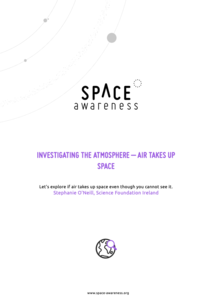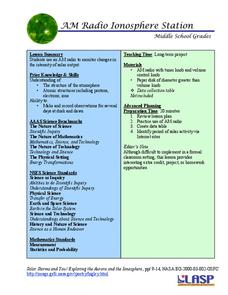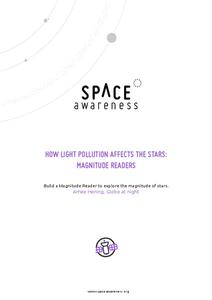Space Awareness
Fizzy Balloons - C02 in School
Carbon dioxide is a very important gas; it is present in the air, used in cooking, and supports plant and animal life. Scholars investigate the properties of carbon dioxide with three different activities. They experience a color change,...
Center Science Education
Looking Into Surface Albedo
How does the color of a surface affect the heating of the earth? Middle school science classes experiment with color and surface albedo to determine the relationship. The website has tabs for an overview, teacher's instructions,...
NASA
Things Are Not Always What They Seem
Science is magic that works. Magical color-changing beads and a coffee can that follows voice commands are just two examples of magic tricks that rely on science. After completing a hands-on activity and an experiment investigating the...
Astronomical Society of the Pacific
Getting Ready for the All American Eclipse!
Give your pupils a front row seat at the biggest light show in the sky this year! In addition to admiring the total solar eclipse, young astronomers can explain the phenomenon with a little help from an inquiry-based instructional...
Science 4 Inquiry
The Impact of the Sun and Moon on Tides
In 150 BC, Seleucus of Seleucia theorized that the moon causes the tides. Scholars learn about what causes tides by studying the interactions of gravity between the sun, moon, and Earth. They use technology to formalize otherwise...
Journey Through the Universe
How Far is Far?
The earth only revolves around one thing — and it's not any of your pupils. The lesson includes two activities dealing with the distance to the sun and the moon. First, scholars create a pin hole camera and use the rules of similar...
Space Awareness
Investigating the Atmosphere - Air Takes Up Space
How do you know there is air? Can you see it, smell it, feel it? To begin the investigation, learners watch a video and discuss what they know about air and the atmosphere. Then, they participate in five different hands-on, inquiry-based...
Earth Day Network
Filtering Water
See the water filtration system up close with a fun science experiment. Young scientists work for several class periods to design a water filter using household objects, and then decide which filter material would be most effective in...
NOAA
Ocean Acidification
If tap water is more acidic than ocean water, why are we so concerned about ocean acidification? The third installment of a 23-part NOAA Enrichment in Marine sciences and Oceanography (NEMO) program focuses on carbon dioxide levels in...
Nevada Outdoor School
Let It Snow! Let It Melt!
Winter weather offers a great opportunity to teach young scientists about the states of matter. This activity-based lesson includes a range of learning experiences, from experimenting with the rate at which ice melts to singing a song...
Salt River Project
How Do We Clean Polluted Water?
How do we clean up oil spills and other pollutants in the water? Explore water treatment strategies with a set of environmental science experiments. Groups remove oil from water, work with wastewater treatment, and perform a water...
Earth Day Network
Staying Green While Being Clean
Clean up the environment with a lesson that focuses on replacing hazardous cleaning supplies with green, environmentally-friendly products. Using a dirty patch of surface as a control area, kids clean other parts of various surfaces...
Science 4 Inquiry
An Investigative Look at Florida's Sinkholes
In May of 1981, the Winter Park Sinkhole in Florida first appeared and is now referred to as Lake Rose. Scholars learn about the causes of sinkholes through an inquiry project. Then, they analyze recent data and draw conclusions to...
Science 4 Inquiry
Temperature of Inner Planets
Mars, Earth, and Venus contain atmospheres that generate weather. Young scientists explore the temperature of inner planets. They create a model simulating the greenhouse effect before researching and answering guided questions to...
Science 4 Inquiry
A Whole New World: The Search for Water
Scholars find Earth won't support humans much longer and need to identify a planet with water to inhabit. They test four unknown samples and determine which is the closest to water. Then they explain and defend their results.
K20 LEARN
Transpiring Trees: Plant Transpiration and the Water Cycle
Looking for a tree-rific addition to your water cycle unit? Teams of young foresters examine the role of transpiration in the water cycle through a week's worth of activities. Pupils analyze how trees take in and transport water during...
Science-Class.net
Rock Candy Crystals
Candy is one of my favorite words, and it's an even better word when it relates to science. Yes, candy science can happen when you grow rock candy crystals with your class. The entire process for growing these edible wonders of nature is...
Smithsonian Institution
Watching Crystals Grow
Amazing science can sometimes happen right before your eyes! The class gets cozy as they watch crystals grow. They use Epsom salts, rocks, and food coloring to create crystals. They'll observe the entire process, documenting every step...
PHET
Measuring the Interplanetary Magnetic Field
Scientists need to figure out how to measure interplanetary magnetic fields, but the magnetic field of the spacecraft is interfering with their readings. Scholars attempt to solve the problem that has perplexed NASA scientists for years.
US Environmental Protection Agency
Sea Level: On the Rise
With the global temperature on the rise, the effects of climate change are starting to be seen. However, many people have a difficult time conceptualizing the long-term effects, such as sea levels rising. Given an easy and effective...
PHET
AM Radio Ionosphere Station
Tune in! Young scientists use an AM radio at home to monitor solar output. The long-term project would be ideal in a flipped classroom or as an out-of-class project.
Space Awareness
How Light Pollution Affects the Stars: Magnitude Readers
Did you know light can decrease visibility? Light pollution absolutely makes it more difficult to see stars. Scholars build a simple magnitude reader to determine the magnitude of stars. They use these data to estimate the impact of...
Baylor College
Water in Your Body
Do you know how much water you have had in the last 24 hours? Do you know how much your body needs? In this hands-on activity, your class members will estimate how much water our bodies lose each day by filling and emptying one-liter...
Science 4 Inquiry
Edible Plate Tectonics
Many people think they can't observe plate tectonics, but thanks to GPS, we know that Australia moves at a rate of 2.7 inches per year, North America at 1 inches per year, and the Pacific plate at more than 3 inches per year! Scholars...
Other popular searches
- Earth Science Inquiry Rocks
- Earth Science Inquiry Water
- Earth Science Inquiry Maps
- Earth Science Inquiry Soil
- Inquiry Earth Space Science
- Inquiry and Earth Science
- Inquiry & Earth Science

























